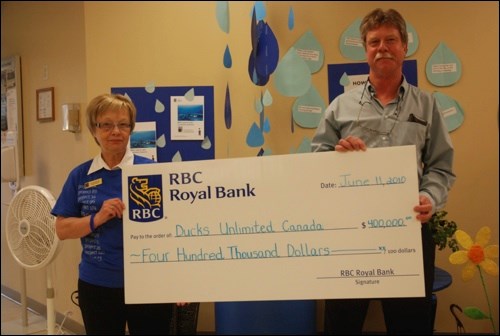The Royal Bank of Canada's first-ever Blue Water Day was not a tribute to the rainy weather that has been plaguing the Battlefords recently; although Mayor Ian Hamilton joked it was "perfect duck weather."
Rather, the day is part of RBC's Blue Water Project, a 10-year initiative designed to protect watersheds and access to clean drinking water by donating $50 million to organizations and charities working towards these causes.
One of those charities, Ducks Unlimited Canada, is receiving $400,000 over the next four years for research in Saskatchewan.
To announce the partnership, events were hosted June 11 at five RBC branches in Saskatchewan, including the North Battleford branch, where a mock cheque was presented to Bill Chappell, the head of habitat asset management for Ducks Unlimited in Saskatchewan.
"We're really quite excited about receiving this money, it's very important to our work," he said.
Chappell explained the grant will fund a research project taking place in the Upper Assiniboine River Basin watershed near Yorkton. He said the biggest issue Ducks Unlimited is dealing with in Saskatchewan is loss of habitat, in particular wetlands. Urban expansion, highway construction and agricultural operations are all factors in the depletion of this natural resource.
"Unfortunately, there's not a lot of economic value placed on wetlands," said Chappell.
He further explained wetlands occur primarily on agricultural lands, and are increasingly being drained. In fact, up to 70 per cent of wetlands have been lost in Canada, which means a huge loss in wetland benefits. Wetlands prevent flooding and erosion, filter phosphorus and nitrogen from water sources, remove greenhouse gases from the atmosphere and are home to over 600 species.
But Chappell understands the plight of farmers and hopes the research will encourage the government to develop effective strategies and policies by quantifying the benefits of wetlands.
"We have to find a fair and equitable way so that landowners don't have to bear all the costs of maintaining these wetlands," said Chappell.
A total of 19 organizations in Canada received grants in this first wave of funding, and more grants will be announced in the following weeks. The Canadian Museum of Nature and the Canadian Geographic Society also received $1.4 million. For more information about the Blue Water Project, or to apply for a grant, visit www.rbc.com/bluewater.




